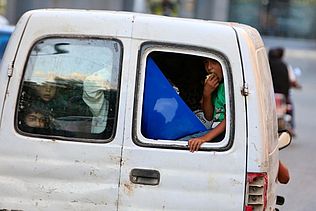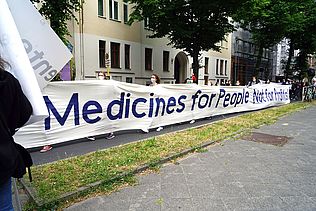The relief over last week's success reports on the vaccine development of the Mainz-based pharmaceutical company Biontech is likely to have been much greater on the Frankfurt Stock Exchange than in the poor quarters of Dhaka or Nairobi. Whether something of the vaccine will be dropped for the countries of the South is still completely unclear. The rest of the world was not even mentioned in the reports. This is not only unfair, but also unreasonable, because one epidemiological insight is still valid: It is over when it is over for everyone. Politicians know that too.
"No one is safe from COVID-19 until everyone is safe from it. Even those who defeat the virus within their own national borders remain prisoners of those borders until it is defeated everywhere". At the opening of the World Health Summit on October 25th in Berlin, Federal President Frank Walter Steinmeier described the nature of the pandemic quite accurately: Liberation from the virus requires global action. However, Germany, Europe and all other major industrialized nations are preventing exactly that. A small group of rich countries, representing 13 percent of the world's population, has already secured more than half of the future supply of leading COVID-19 vaccines, reports the aid organization Oxfam. Specifically, rich countries have already purchased or are in the process of purchasing more than five billion doses of vaccines from candidate countries before clinical trials are completed. Less than 800 million doses are earmarked for the world's poorest countries, suggests Duke University in a recently published study. Germany has concluded such exclusive contracts, too.
Taking a closer look at the landmark decisions made since the beginning of the pandemic, it quickly becomes clear that the industrialized nations are sticking to neoliberal policies that safeguard the right to profit for companies over human rights, specifically fair and equal access to vaccines. This order is defended with all power and this can be understood quite literally: Looking at the struggle for the coming vaccines, it becomes clear how the crisis is to be solved - at the expense of the poor. The side effects are fatal and will also dramatically increase economic, geographical and social inequalities. There is a very real threat of restoring the division of the world into North and South, even though verbally, this division is to be overcome.
The proposal by India and South Africa
Interestingly, there is no lack of alternatives. Recently, the governments of India (ranked third in the world with around 130,000 corona deaths) and South Africa, which is affected by the corona pandemic like no other African country, applied to the World Trade Organization (WTO, not to be confused with the World Health Organization, WHO) for an exceptional rule in the 1994 TRIPS Agreement, which regulates the trade-related aspects of intellectual property. India and South Africa argue that a fundamental and comprehensive suspension of the regulations is needed until the world population has developed immunity against the virus.
The controversial TRIPS Agreement, which is still controversial today, was concluded in 1995 on the initiative of industrialized nations and international companies such as Microsoft. The explicit aim was to outbid objections from the countries of the global South in previous trade rounds. However, the agreement sets rules for exemptions in the event of a health emergency which allow drugs or a vaccine to be produced locally and at low cost via so-called compulsory licenses or parallel imports, bypassing patent protection. The so-called 'waiver' proposed by South Africa and India goes further than the planned exceptions. Already during the first debate in October this year, all major industrialized nations, including the entire EU, rejected the proposal. Negotiations are continuing, but the majority situation gives little cause for optimism. Since there is no doubt that the Covid-19 pandemic is a state of emergency, there must be other reasons for this blockade: The interests of the pharmaceutical industry have priority.
Unfortunately, there is no lack of experience of the devastating effects of global health policy following them. Even during the HIV-AIDS pandemic of the 1980s-which is by no means over, with more than half a million people still dying of the disease every year-industrialized nations and the pharmaceutical industry argued that strong patent protection was needed to promote innovation. This argumentation has persisted in public awareness since today and is probably one of the pharmaceutical industry's greatest advertising successes. There is no evidence whatsoever. As a result of the patent regulation, of which TRIPS is only one example, every cost reduction had to be fought for years in globally networked political battles. Tens of thousands of people died of AIDS alone because of the high cost of drugs. Nevertheless, politicians decided to learn nothing from these experiences. The governments of the world are making billions available for research and development, with the EU alone contributing 6.5 billion euros. These are mostly public funds, large sums of which go to the pharmaceutical industry without the pricing policy for the future vaccine being regulated in public interest.
Blockade within the WHO
A similar event occurred within the framework of the WHO. Here, too, alternative paths are being fought over. The WHO recognized very early on the danger that the existing patent regime would rather hinder than encourage innovation. For this reason, it announced the founding of the COVID-19 Technology Access Pool (C-TAP) in June on the initiative of Costa Rica. The C-TAP is to be established to collect patents and all other forms of intellectual property such as know-how, data, trade secrets, software and to support technology transfer. The creation of a patent pool has already shown in the fight against the HIV virus that such procedures can be enforced and are successful. Today, all intellectual property of the treatments for HIV recommended by the WHO is licensed to the patent pool.
40 countries have supported the C-TAP initiative. Most of them are countries from the global south, from Europe only Belgium, the Netherlands, Luxembourg, Portugal and Norway are involved. However, almost all countries where pharmaceutical companies are based are not included. The reaction of the pharmaceutical industry itself did not take long to arrive: the pharmaceutical company Pfizer considers the proposal to be "dangerous" and "nonsense", while AstraZeneca recommends that the pharmaceutical industry should "voluntarily give up some of its products without any profit interest". In fact, all industrialized nations have adopted this attitude and are backing a counter-model: ACT ("Do something!"), short for "Access to COVID-19 Tools", is a classic private-public cooperation project. Involved are governments and industry, vaccine alliances and philanthropic foundations, most notably the Bill & Melinda Gates Foundation. The main difference to the WHO initiative is that ACT leaves the issue of patents untouched. This alliance provides a space for private sector actors in particular to stage charitable activities while excluding the issue of public goods.
Talk globally, act nationally
Health research, whose only incentive is the prospect of a patent, excludes precisely those people from access to medicines who need them most. Through ACT, the countries of the South become dependent on humanitarian gestures from the industrialized nations and have to take a back seat in the distribution of the vaccine. If the political framework was created to treat medical knowledge and its end products as a common good of humanity, vaccines could be distributed fairly to those who need them most, for example health workers in the poor districts of Nairobi, Rio or Hamburg-Veddel. However, only 3 percent of the vaccine doses are initially earmarked for health workers.
What we need is a concept that considers pharmaceuticals and other essential areas of public services as public goods and excludes them in principle from patent protection. The attitude of the industrialized nations and the German government shows how puny the much-praised multilateralism of Germany and Europe really is. It is not much more than the sum of nationalisms of the dominant states, wrapped up in fine words without meaning.
Anne Jung is global health adviser at medico international.
Translation: Julian Toewe




